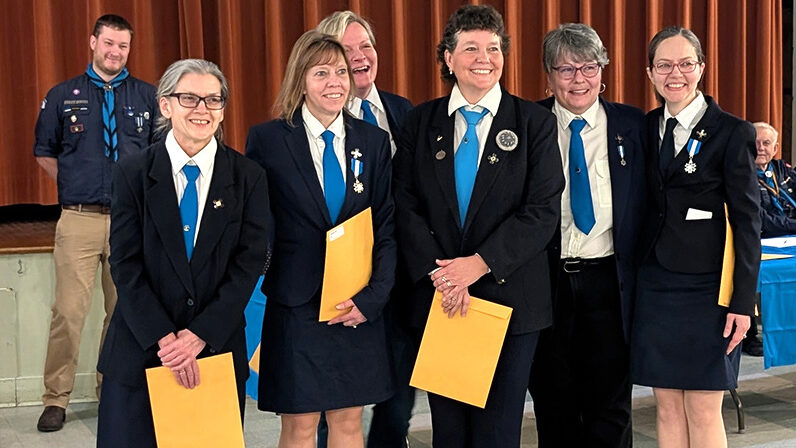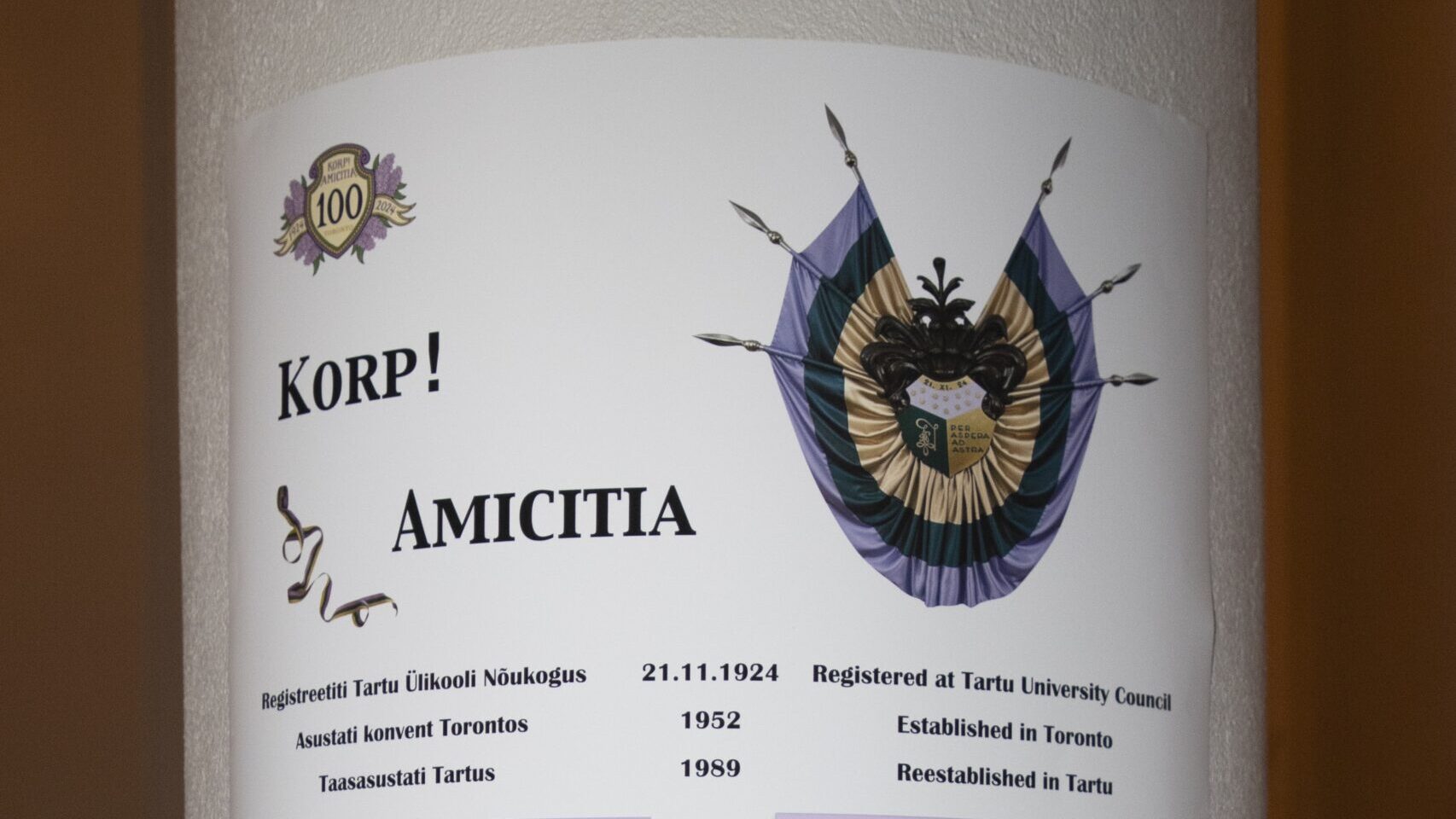There were some fundamental principles and common practices that pertained to all 3 organizations:
– all Directors that sit on their respective Boards are volunteers, with no one being reimbursed for their service; this rule prevents any potential conflict of interest with the Directors; Management may attend Board meetings but they have no voting privileges
– each Director is elected for a term of 3 years, and can only serve for three consecutive terms; after 9 years they must retire from the Board for a minimum of 1 year
– only the Members can approve the Auditor of the Corporation, elect the Directors to the Board and approve changes to the Corporation’s By-laws (as per legislation);
[An example for Tartu College. An important distinction to note is between members (all of the members belonging to a Korporatsioon or Selts) and the legal term Members (a Korporatsioon or Selts appoints 1 or 2 Members to represent them at the Annual Meeting of the Members)]
– a similar legal framework was adopted for each of the three organizations
Tartu College (a Not-for-Profit Corporation of Ontario, without share capital; established in 1968)
Tartu College’s Letters Patent Objects were written and had not been changed since1968. Its By-laws were written at the same time and numerous By-law amendments had been made over the years, and were deemed by our lawyers not to be compliant with current practices. Tartu College’s key mandate had been to promote, preserve and increase the knowledge of the Estonian experience in Canada. Its longevity can be attributed to its successful model of running a student residence, with its cash flow surpluses permitting not only investments in the building but also to advance Estonian studies in support of its Estonian focussed mandate.
Tartu College’s main objective is the prudent management of its key asset – the Tartu College building and any potential building development. It has retained its objective of promoting Estonian programs and studies by outsourcing these activities to the ESC and CESF with financial support.
The ownership structure for Tartu College was clarified by having only the academic organizations (Korporatsioonid and Seltsid) allowed to vote at the Annual Meeting and sit on the Board of Directors. The Korporatsioonid and Seltsid are referred to as the Participating Organizations in the By-laws and are the legal owners of Tartu College (albeit without any economic equity). As a Not-For-Profit Corporation without share capital, no one has any economic interest in Tartu College. Should Tartu College ever be sold, the net proceeds from the sale of the building would go to other Not-For-Profit Corporations in Ontario.
The responsibility of the Participating Organizations is to nominate the 26 Members that elect 9 Directors to the Board and the By-law requires that all of these 9 Directors be Members. The Participating Organizations are defined as two types, ones with more than 25 members (who are allowed to nominate 2 Members) and the others with less than 25 members (nominate 1 Member) [See Appendix A]. The ESC nominates 2 Directors to the Tartu Board to arrive at the full complement of 11 Directors. (The intent of having 2 Directors from the ESC sit on the Tartu Board is to ensure that there is effective communication between Tartu and the ESC on matters of mutual interest; these 2 Directors also become Members of Tartu College for a total of 28 Members.)
It should be noted that the newspaper Eesti Elu remains as a part of Tartu College.
The Estonian Studies Centre (a Registered Charity of Ontario; established in 2008)
A Registered Charity in the Province of Ontario is required to operate for the “public good” and the need to have “a charitable purpose”. Registered Charities have recently attracted increasing Canada Revenue Agency and legal scrutiny resulting in more attention being paid to this sector. Since the Board of Directors has the ultimate responsibility for its operations, proper governance and especially accountability of its funding processes are mandatory to the proper functioning of any Registered Charity.
The ESC is currently made up of 9 Operating Programs [See Appendix C] that compose the ESC. Each ESC Operating Program nominates or elects 2 Members to its own Operating Committee, and all 9 of the ESC’s Operating Committees have the responsibility to elect Directors to the ESC Board of Directors at their Annual Meeting. As a Registered Charity, legal requirements only allow for a single organization without any sub-organizations. Therefore all entities working under the ESC umbrella are referred to as Operating Programs (e.g. Ööbik) which are managed by their own Operating Committee. The ultimate responsibility for all activities at the ESC reside with the ESC’s Board of Directors.
The ESC’s Board consists of 9 Directors. Five Directors must be appointed by the Members of its Operating Committees (and must be Members), two Directors are appointed from Tartu College and two are outside independent Directors who must also be elected by the Members. The Operating Committee Members attend the ESC’s Annual Meeting to perform these duties.
Each Operating Program at the ESC is required to i) have their bookkeeping audited on an annual basis by the ESC auditor, ii) have an annual operational review with the ESC Board, and iii) provide their input to the ESC annual budget process should they require funding. The approval and oversight of funding for the Operating Programs and for external programs are an important management issue for the ESC’s Board.
The benefits accruing to ESC Operating Programs are significant. Operating Programs will be legally incorporated, funds that would be donated to that organization would be tax deductible (the funds would be payable to the ESC, with a specific designation to the Operating Program), funding will have a formal, legal basis and the Operating Committees will have greater input into the overall direction of the ESC.
In summary then, the ESC will have its Members chosen from the Operating Programs (via their Operating Committees), who in turn have the responsibility of electing the Directors to the Board, approving the ESC’s Auditor and having sole approval of any By-law changes. The Board of Directors will have the ultimate responsibility for all of the activities of the ESC’s Operating Programs, including its funding support.
The Chair of Estonian Studies Foundation (A Registered Charity and Trust of Ontario; established in 1982)
The CESF was instrumental in establishing the Elmar Tampõld Chair of Estonian Studies at the University of Toronto. The Foundation and Tartu College were key drivers in raising the money to establish this Chair in perpetuity at the University. Its mandate is to act and support other academic institutions and scholars to promote Estonian knowledge and research.
The CESF Reorg II Committee had the least amount of work of the three committees. It reviewed the Foundation’s Letters Patent Objects, the template By-law of Tartu College and other workings and made minimal changes. The existing Directors are the Members of the CESF Corporation and they decide who they will elect to the Board of Directors. In choosing candidates, the Board will consider the need for representation from Tartu College, the ESC, academia and the general community at large. At the Board’s discretion, the number of Directors can vary from 5 to 11.
Summary
The reorganization at Tartu College, along with its two sister organizations, the Estonian Studies Centre and the Chair of Estonian Studies, was completed in 2014 and 2015. The challenge ahead with its new governance structure and responsibilities, is to continue the legacy, 50 years in the making, of maintaining the financial viability of Estonian studies in the Canadian context, providing a home for the Estonian Korporatsioonid and Seltsid and advancing the Estonian narative in Canada.
by Jaan Meri who is the current Chair, Board of Directors of Tartu College; Chair, Board of Directors of the Estonian Studies Centre; and a Director of the Chair of Estonian Studies Foundation.
Reorg I Committee(Tartu College): Helge Kurm, Toomas Marley, Jaan Meri, Tõnu Tõsine
Reorg II Committee(ESC): Asta Lokk, Toomas Marley, Jaan Meri, Kaja Telmet
Reorg II Committee (CESF): Peeter Einola, Toomas Marley, Jaan Meri
Appendix A – A comparison of the Governing Structures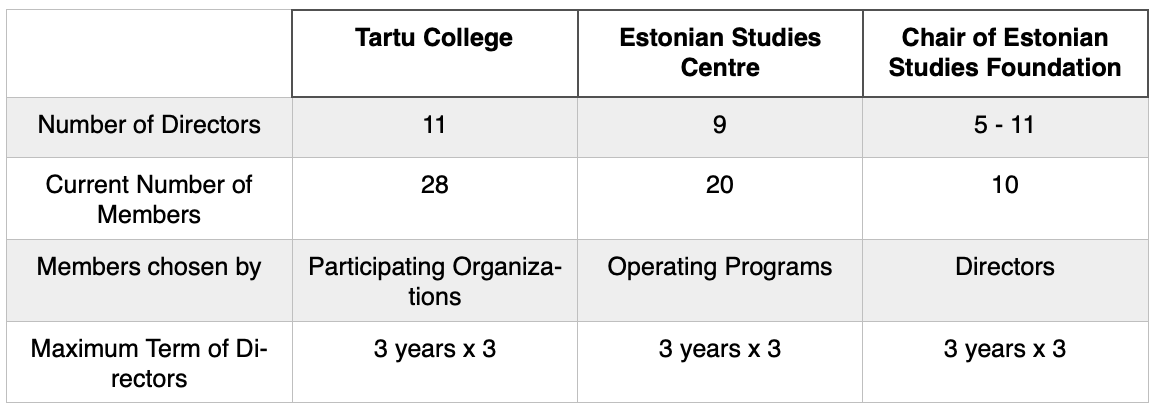
Appendix B – Participating Organizations at Tartu College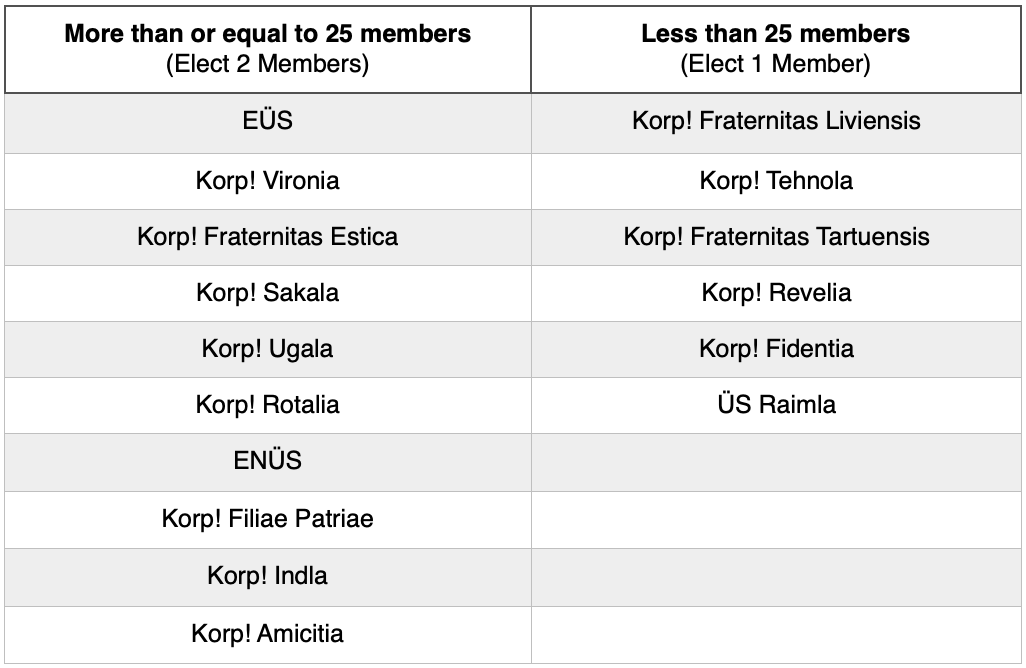
Appendix C – Operating Programs at Estonian Studies Centre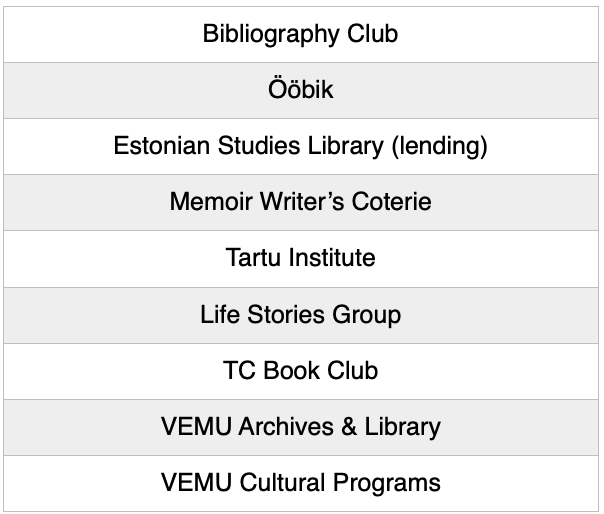
Appendix D – Board of Directors 2020 – 2021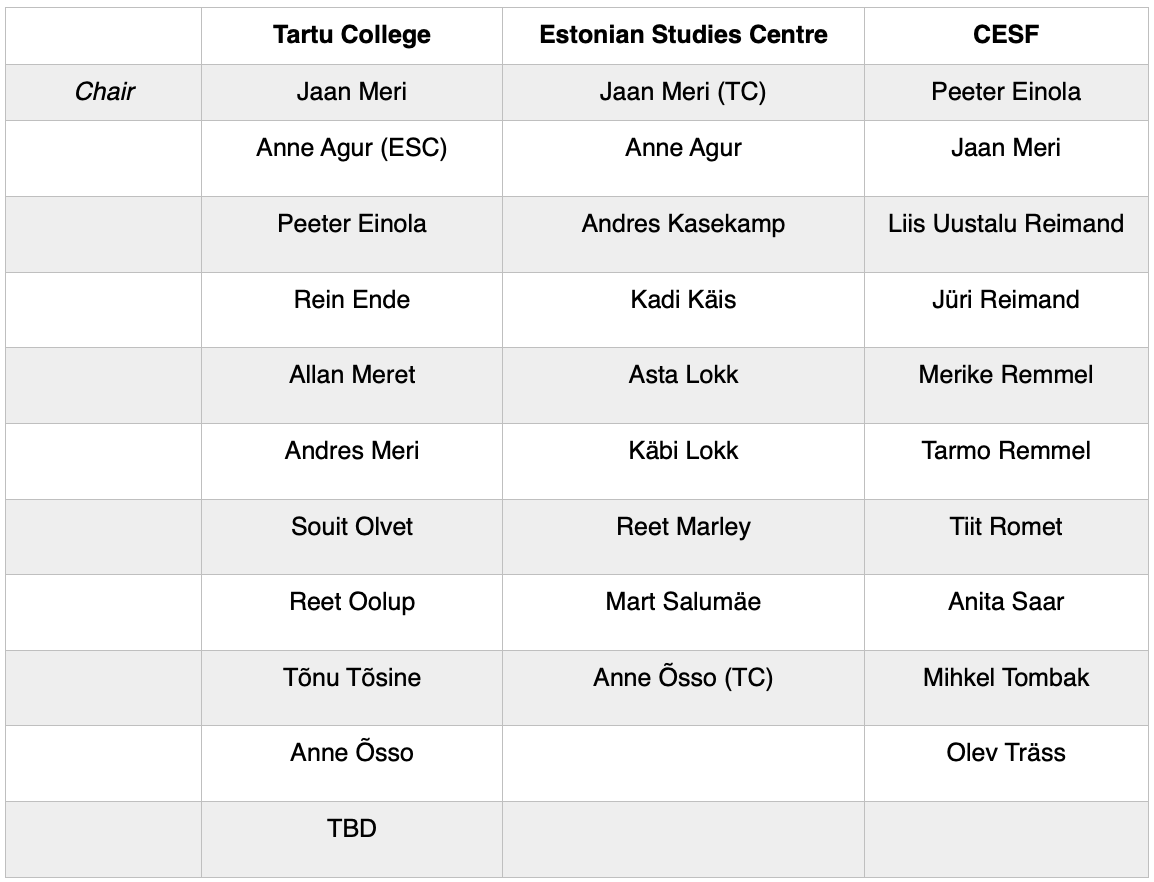
Appendix E – Letters Patent Objects
1. Tartu College
“The objects of the Corporation shall be as follows:
a) To construct, maintain and operate a building(s) for the Corporation to provide:
(i) dwelling and other accommodation for scholars and students at the University of Toronto and other post-secondary institutions of learning;
(ii) conference, meeting and other facilities to be used for seminars, lectures and correspondence courses particularly related to or attended by the Estonian community;
(iii) conferences, meetings and exhibitions for the discussion and exchange of views on culture, language, history, arts and science, particularly those of interest to the Estonian community;
(iv) space usage for museums, archives and libraries especially dedicated to preserving the history of the Estonian community in Canada; and
(v) such other activities consistent with the objects of the Corporation.
b) To establish and operate a Community Centre and community organization for the purpose of:
(i) providing facilities and services to the residents of Ontario who are of Estonian heritage;
(ii) preserving and promoting the traditions of Estonian-Canadians and the Estonian culture, language, history, arts and science;
(iii) sponsoring events for the promotion of Estonian culture, language, history, arts and science;
(iv) maintaining a centre for Estonian culture, language, history, arts and science; and
c) To establish, acquire and accumulate funds for scholarships, bursaries and grants for scholars, students, post-graduate students and institutions with similar Objects as the Corporation.”
2. Estonian Studies Centre
“The objects of the Corporation shall be as follows:
a) To establish and operate resource libraries, archives, museums and provide opportunities for research and the collection and dissemination of knowledge regarding Estonian culture, language, history, arts and science.
b) To increase public knowledge and appreciation of the Estonian culture, language, history, arts and science.
c) To advance education by providing public access to events related to the Estonian culture, language, history, arts and science.
d) To advance the public’s appreciation of the arts by promoting artistic works particularly those connected to Estonian culture, language, history, arts and science, and providing access to artists to exhibit, present and perform their works.
e)To receive and maintain a fund or funds to apply all or part of the principal and income therefrom, from time to time, to registered charities under the Income Tax Act (Canada).”
3. Chair of Estonian Studies Foundation
“The objects of the Corporation shall be as follows:
a) To establish and maintain any Chair of Estonian Studies at any university in the Province of Ontario, provide for lectures, classes, seminars, meetings and conferences to advance Estonian Studies, receive and maintain any funds for the purpose of endowing any Chair of Estonian Studies at any university in the Province of Ontario and enter into such agreements as may be necessary for the payment to the university for all or part of any funds required.
b) To encourage and further academic excellence for the pursuit of Estonian Studies at any university in the Province of Ontario, through the provision of resources, scholarships, equipment, books, journals, and materials consistent with achievement of excellence in Estonian Studies.”

